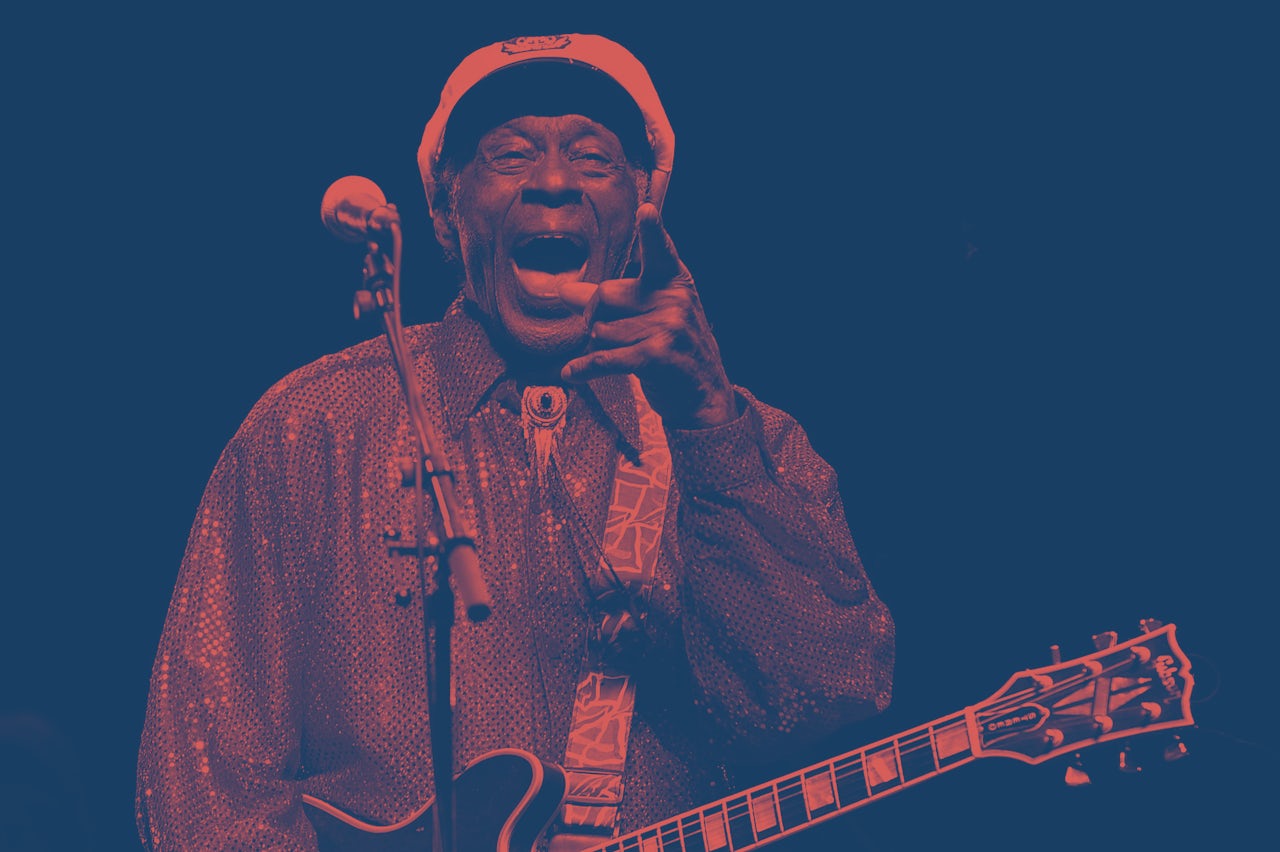Drop the needle on “School Days,” Chuck Berry’s talky 1957 gem about a day in the life of an American teenager, and the opening riff will likely send an instant charge through your body. In more recent decades, oldies stations and Back to the Future did his music a disservice, overplaying it to the point of desensitizing the listener to its visceral impact. This is actually raw shit, shocking in its time, and two decades ahead of the hip-hop it would predict.
When Berry died on Saturday at age 90, my first thoughts were about that song, which builds to a thrilling “Hail! Hail! Rock ’n’ roll!” crescendo after two minutes and 15 seconds. Then there was “Maybelline,” “Brown-Eyed Handsome Man,” and the rest of his sprawling discography. If any rocker deserved a Nobel Prize for Literature, it was this poet of the everyday, not Bob Dylan.
That’s where my head was — celebrating one of my favorite musicians without qualification, and therefore oversimplifying him. I was part of the problem, and it took an editor to remind me that the, ahem, great man had a great many victims. In the ’60s, Berry spent nearly two years in jail for violating the Mann Act, which prohibits the transporting of women and girls across state lines for “immoral purposes,” and later was accused by multiple women — and children — of filming them while using the bathroom of a Wentzville, Missouri, restaurant he owned. He was charged in 1988 for punching a woman in the mouth in a New York hotel so hard that she required stitches; this woman was not his long-suffering wife.
When compared to real-world actions that harm real-world people, art pales in significance. It’s a tough discussion, and one we’re hardly ever having. Even former President Obama weighed in with a glowing tweet. When in the name of Woody Allen will we finally learn?
When in the name of Woody Allen will we finally learn?
If you’d lasted deep into some of the obituaries and tributes to Berry this weekend, you would have gleaned a sliver of information about his alleged abuses, in a passing and underemphasized way. The New York Times headline read, “Chuck Berry, Rock and Roll Pioneer, Dies at 90.” This was accurate but demonstrated how we usually spotlight an icon’s work and ignore his victims; the story itself made no reference to scandal until the 23rd paragraph. A fairer headline would have been, “Chuck Berry, Musical Genius Accused of Sexual Misconduct, Dies at 90.”
As Berry’s biographer once said, “The inventor of some of the most joyous, life-affirming, zestful rock and roll is a mean, suspicious, dirty old man.”
The St. Louis native turned to music after serving time for armed robbery as a teenager. By the mid-1950s, he had made himself into one of the most influential songwriters and performers of the century, with devotees and imitators that included Keith Richards and John Lennon, and a stylistic reach that extended into and beyond the MCs of the 1970s Bronx. His most prolific period as a recording artist thudded to a halt in 1959 with an arrest and conviction for violating the Mann Act; Berry, then 33, was accused of having sex with a 14-year-old girl.
It’s important to note the racial context of the Mann Act, which was used to drum up charges against other prominent black men, such as the boxing champion Jack Johnson. Berry’s first conviction was actually overturned because the judge had used racist language during the trial, but he was convicted a second time and served 20 months.
“Never saw a man so changed,” fellow rock pioneer Carl Perkins later said of Berry, with whom he toured England in 1964. “He had been an easygoing guy before, the kinda guy who’d jam in dressing rooms, sit and swap licks and jokes. In England, he was cold, real distant and bitter. It wasn’t just jail. It was those years of one-nighters; grinding it out like that can kill a man. But I figure it was mostly jail.”
More serious transgressions were still to come. After serving time for tax evasion in the late 1970s, another troubling scandal came in 1989, when Hosanna A. Huck, a former cook at Berry’s restaurant, sued him for making videotapes “for the improper purpose of … entertainment and gratification." A class action lawsuit from more women followed. The next year, police raided Berry’s home and found a stash of videotapes of women undressing and using the bathroom at the restaurant. Initial charges of child abuse, stemming from the fact that several of the victims filmed were under 17, were eventually dropped, and Berry pleaded instead to marijuana possession.
And yet a Google news search of Berry’s name late Sunday night turned up a series of light, sometimes ridiculous headlines. Esquire: “Chuck Berry and Jimmy Breslin Reinvented the English Language.” The New Yorker: “Chuck Berry Lives!” NBC News: “Chuck Berry Wasn’t the Least Bit Shocked by Punk Rock.”
Folks produced a lot of writing about Berry over the past two days, and very little of it dug into the most significant aspects of the man. Or considered how traumatic it might have been for a woman beaten bloody in a hotel room or a child filmed in a bathroom to read about how everyone loved the guy who did it.
If it seems insensitive to mention these offenses mere days after Berry’s death, I would argue that oversimplifying a person’s life does him or her, and all of us, a disservice. When we rhapsodize on what a bunch of songs mean to us, we must do so while trying to understand the actual life that produced them. If we gloss over horrible acts when committed by a brilliant artist, we help to normalize them everywhere. What does a genius have to do be held accountable for his life?

